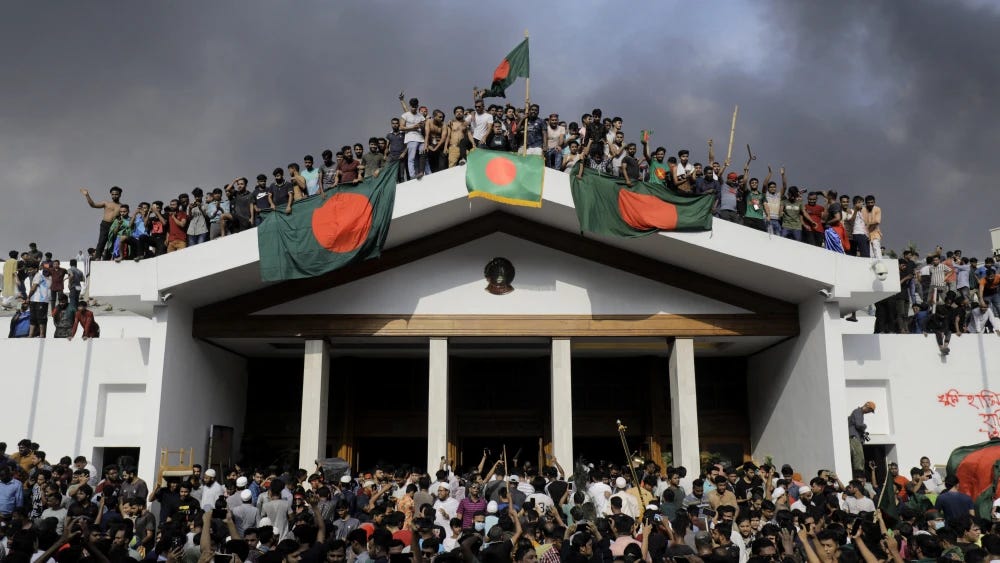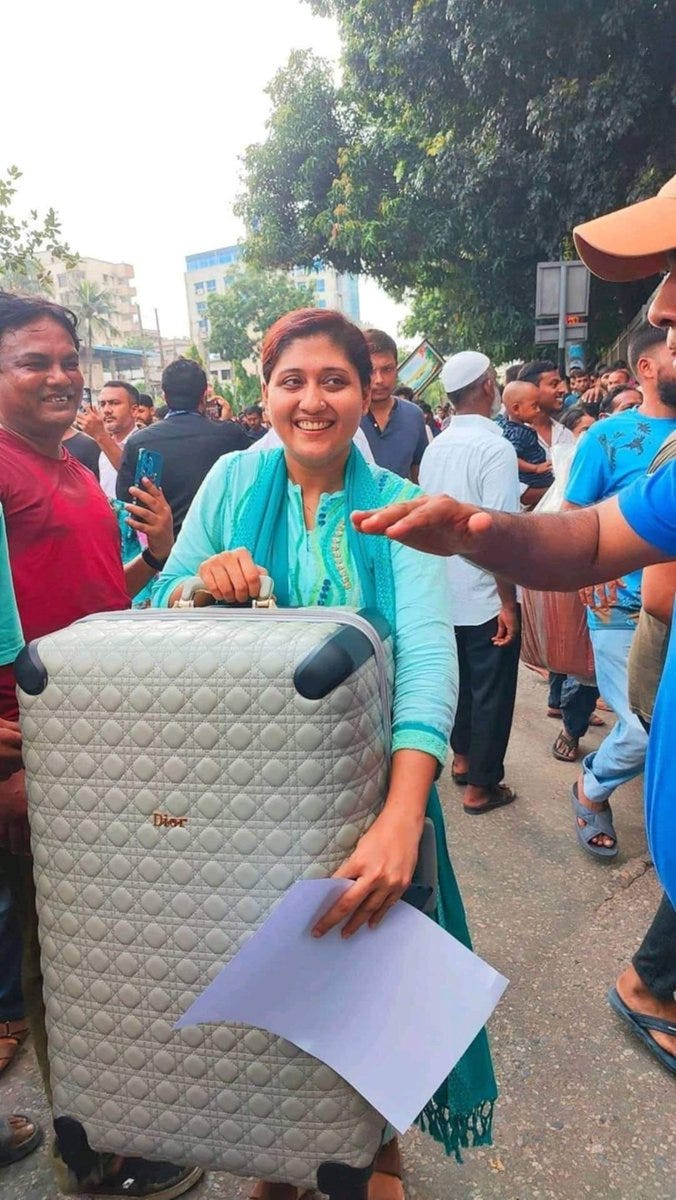Welcome to the Brown History Newsletter. If you’re enjoying this labor of love, please do consider becoming a paid subscriber. Your contribution would help pay the writers and illustrators and support this weekly publication. If you like to submit a writing piece, please send me a pitch by email at brownhistory1947@gmail.com.
Don’t forget to check out our SHOP and our Podcast.

Recommended Reads:
After Overthrowing a Dictator, Bangladesh Must Now Build a Democracy

In the early hours of August 5th, 2024, I woke up to discover that my country had entered a new era in its history. A tumultuous sequence of events, having steered Bangladesh into truly unprecedented territory over the course of one afternoon, marked the culmination of what had become a national revolution. Fifteen years of former prime minister Sheikh Hasina’s autocratic rule came to a crashing and humiliating halt as she fled the country in a helicopter. Her residence, known as the Gonobhobon, was in tatters: throngs of protesters swarmed in through broken doors and shattered windows, ransacking the property and hauling out whatever “souvenirs” they could find. Other revolters stormed the Parliament, raiding ministers’ offices and casually smoking cigars within the previously hallowed halls. The once-imposing authority of the ruling party had been discarded. The government had been overthrown.
As the chief of the army made a rare television appearance to confirm that Sheikh Hasina had resigned, jubilation erupted nationwide. Scarcely in the country’s history had the streets been so densely packed with celebrating masses. An ocean of green-and-crimson flags unfurled over hundreds of thousands of heads. Innumerable voices harmonized in belting out patriotic anthems. Murals of Sheikh Hasina, placed ubiquitously throughout the country in her government’s near-religious elevation of her, were graffitied and scrawled over. The roads that had just days prior seen brutal crackdowns on protesters by militarized police forces and ruling party mobs, resulting in deaths that remain uncounted but approach a thousand, were now teeming with Bangladeshis of all backgrounds rejoicing the downfall of the authoritarian dictatorship that had trapped the country in a vice-grip for over a decade.
In fact, it was the government’s own ruthlessness and disregard for its citizens that had forced anti-discrimination protests to evolve into a national revolution. On July 14th, university students across the country had assembled in marches against the government’s corrupt abuse of public sector employment quotas. The ruling Awami League party’s response - deploying armed mobs to raid college dorms, set fire to hospitals, and attack protesters with machetes, as well as providing impunity to police forces as they slaughtered students by the dozens - sparked nationwide outrage and horror. Galvanized by these killings, a mass movement with the singular demand of the Prime Minister’s resignation took hold of Bangladesh, climaxing on August 5th with the ouster of Sheikh Hasina. (Having been rejected from entering the United Kingdom, she is now holed up in a safehouse in India and, somewhat hilariously, has stated that she will not attempt a political comeback.)

In the wake of the ruling party’s removal from power, many Bangladeshis have begun calling August 5th the “Second Liberation Day”, bestowing it a similar honor as the 1971 War of Liberation that freed us from authoritarian Pakistani rule. However, even the most basic recollection of Bangladeshi history will remind us that our victory in the war did not miraculously democratize the country, nor even liberate its people. Although no longer a deprived Pakistani colony, Bangladesh remained stifled in the grasp of domestic governments that routinely prioritized partisan gain over the well-being of their constituents. “Democracy” quickly dissipated into a fading pipe dream under the weight of draconian restrictions on civic life, economic mismanagement, and one-after-the-other military coups that each placed a new tyrannical leader in power. Even Sheikh Mujibur Rahman, the country’s charismatic founding president (and father of Sheikh Hasina), had become broadly perceived as an authoritarian by the time he was assassinated in 1975. He had effectively established a one-party state by curtailing judicial and legislative powers and through his crackdown on free speech and political assembly. (The apple indeed falls close to the tree.) And of course, there has never been a time in Bangladeshi history in which its Hindu, Christian, and Buddhist communities, as well as its various indigenous tribal groups, have been ensured the fundamental freedom of worship or even basic safety from religious extremists and settler groups. For a country that prides itself on achieving liberation from fascists who sought to exterminate our culture, Bangladesh has certainly not afforded the same liberties to minority groups whose beliefs, ways of life, and very existence have been under threat since the nation’s founding.
In the wake of August 5th - the so-called Second Independence Day - millions of people across the country do not feel so independent. They have not joined in on the jubilation nor participated in the gleeful posting of liberation-themed Instagram graphics. In fact, they are scared, because there are currently more questions than answers about what is to come. Ethnic and religious minority communities are rightfully concerned about what kinds of political interests will fill the power vacuum left by Hasina’s departure. Indeed, some of the Awami League’s most ardent opponents are religious extremists who would joyfully advocate for the genocidal “cleansing” of such communities. The same groups would also not hesitate to trample on basic civil liberties and political freedoms in similar ways that the Hasina dictatorship did. If this truly is to be a Second Independence Day, we must remember that a nation is only as righteous as it treats its most powerless people, and we must proceed with the “democratization” of Bangladesh accordingly.






